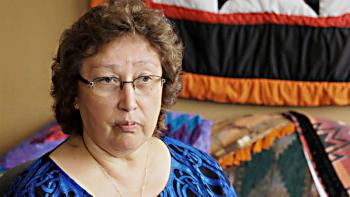Image Caption
By Shari Narine
Windspeaker Contributor
PRINCE GEORGE, B.C.
Barb Ward-Burkitt was at her mother’s side as she relayed her Indian residential school experience through the Independent Assessment Process. Now her mother has passed away and Ward-Burkitt, as an intergenerational residential school survivor, doesn’t want to lose that story.
That’s the argument the Coalition for the Preservation of the Truth will be offering when it stands before the Supreme Court of Canada on May 25 in the Canada v. Fontaine appeal.
The coalition has five minutes to make the oral arguments that will go along with its 10-page factum, said coalition counsel Nicole Bresser, with DGW Law Corporation.
The coalition is one of three parties with intervenor status in a contentious case that will decide whether or not records produced through the IAP should be destroyed after 15 years or kept under the strictest privacy laws.
“The Supreme Court of Canada only allows people as intervenors who they believe will be able to bring a new perspective on the case,” said Bresser.
The coalition contends that the legal decisions surrounding the fate of the documents were based on what IRS survivors alone had to say.
“The new perspective that we’re bringing is the impacts of residential schools on intergenerational survivors and the importance of preserving documentation for the collective understanding of the impacts of residential schools for generations to come,” said Bresser.
Ward-Burkitt, spokesperson for the coalition and executive director with the Prince George Friendship Centre, understands that both personally and professionally.
“The main reason that I feel so strongly about it is just around the intergenerational impact of residential schools. It’s impacted myself, my children, my grandchildren and many, many, many of the people who access services here at the friendship centre have been impacted in the same way,” she said.
The Prince George Friendship Centre is one of about two dozen organizations and individuals across the country that comprises the coalition, which was spearheaded by Witness Blanket creator Carey Newman. Membership in the coalition includes both intergenerational survivors and IRS survivors.
“That trauma is passed down inter-generationally and it’s important to have that information included in those files in order to disrupt that cycle,” said Ward-Burkitt.
She says her mother would have wanted her children and grandchildren to know her story.
“There was a time that my mother wouldn’t have been okay with sharing that story, but I think when she saw the impact of being in residential school on her life and consequently on her way of being as a parent and some of the intergenerational impacts that have happened as a result of her being in residential school, I think that that changed for her somewhat,” said Ward-Burkitt.
She believes that the present ruling would result in her mother’s story being destroyed. Her mother passed away without a will and because of that, her story will be destroyed as the Ontario Superiour Court upheld the lower Ontario court’s decision that only those who give permission will have their records kept.
There are many Indian residential school students who have passed on or are infirm, and even more survivors who will be difficult to contact, said Bresser. And those who are contacted may be further traumatized depending on the process used.
The coalition is proposing that all the documents be stored at Library and Archives Canada or another venue, such as the National Centre for Truth and Reconciliation.
“What’s important to understand about this case is not that all of a sudden everybody gets access if they get stored, that you have access to a ton of information. They’re stored under the mandate of privacy legislation which is very strict,” said Bresser.
She points out that records will be redacted – that is, names, dates and other identifying markers blacked out.
“A win for the coalition would be to keep the stories of residential schools while honouring survivors … and that the privacy legislation that is in place is robust enough to protect individual survivor’s autonomy if they choose,” said Bresser.
And just as important, she adds, if this information – even redacted – becomes available for survivors, it will allow them to honour their stories within their own communities.
The coalition has been raising funds through a gofundme page with a goal of $50,000. Right now, the fundraising effort sits at $10,165.
Brenner says her law firm will continue to advocate for its clients at the Supreme Court regardless of the money raised. While Brenner, who is Indigenous, has been doing the lead up work for the case, senior lawyer Christopher Devlin will be doing the presentation to the Supreme Court.
Funds raised will also be used to help cover travel costs for survivors and intergenerational survivors to attend the hearing.
“That’s very important because regardless of what happens, at least survivors and intergenerational survivors should be … able to take up the space in Supreme Court to be a presence there,” she said.
The IAP Chief Adjudicator, churches and numerous Indigenous organizations, including the Assembly of First Nations, are asking the Supreme Court to retain Ontario Superiour Court’s decision and destroy the records.
Canada and the Truth and Reconciliation Commission want the records kept, archived and access restricted. The lower court also ruled that the records be retained for 15 years, within which time survivors would be contacted and could request their records be archived.

